Syria talks bring offer of exit from siege of Homs
Updated: 2014-01-27 09:31
(Agencies)
|
||||||||
 |
|
A child clears damage and debris in the besieged area of Homs January 26, 2014. [Photo/Agencies] |
GENEVA - The Syrian government said women and children could leave the besieged rebel city of Homs on Sunday as negotiators from the warring sides discussed humanitarian gestures on a second day of face-to-face talks in Geneva.
Government and opposition delegates also spoke of releasing prisoners and enabling access for aid convoys during what the UN mediator acknowledged was a slow process but one which he hopes will lead on Monday to broaching the central issue that divides them after three years of civil war - namely Syria's political future and that of President Bashar al-Assad.
Homs, occupying a strategic location in the centre of the country, has been a key battleground. Assad's forces retook many of the surrounding areas last year, leaving rebels under siege in the city centre, along with thousands of civilians.
Syrian Deputy Foreign Minister Faisal Mekdad told a news conference after Sunday's meetings that the government would let women and children leave the city centre if rebels gave them safe passage. UN mediator Lakhdar Brahimi said he understood that they would be free to quit Homs immediately.
Mekdad said: "If the armed terrorists in Homs allow women and children to leave the old city of Homs, we will allow them every access. Not only that, we will provide them with shelter, medicines and all that is needed.
"We are ready to allow any humanitarian aid to enter into the city through the ... arrangements made with the UN."
In the city itself, however, opposition activists said rebels demanded a complete end to the blockade and opposed a limited ceasefire. An online video showed demonstrators with Islamist flags denouncing the Geneva talks as "treachery".
Brahimi, who presided on Saturday over the first direct meeting between the two delegations, met both together again on Sunday morning, before holding discussions with each side separately in the afternoon.
At another joint session on Monday, he hopes to begin discussion of a UN plan for a transitional government.
Acknowledging the slow start to proceedings which began with a formal international conference on Wednesday, Brahimi said: "This is a political negotiation ... Our negotiation is not the main place where humanitarian issues are discussed.
"But I think we all felt ... that you cannot start a negotiation about Syria without having some discussion about the very, very bad humanitarian situation that exists."
There was little sign of a softening of positions on the core issue - whether or not Assad should quit now, as the opposition and their Western and Arab backers say was agreed by a UN conference at Geneva 18 months ago.
"The president of the Syrian Arab Republic stays until the Syrian people says something else," said Mekdad, repeating the government position that Assad can stay and win an election.
For the opposition, spokesman Louay Safi said Monday's session with Brahimi would show if the government was willing to negotiate: "Tomorrow we start talking about transition from dictatorship to democracy. The regime is ... stalling."
PRISONERS
Brahimi said opposition delegates, who have asked for the release of nearly 50,000 detainees, had agreed to a government request to try to provide a list of those held by armed rebel groups - though many of these groups, fighting among themselves, do not recognize the negotiators' authority.
Mekdad said the government had examined an opposition list of 47,000 people believed to have been arrested by Assad's forces and found most had either never been held or were now free. He also denied that any children were being held.
Russian Foreign Minister Sergei Lavrov, whose government has helped Assad resist Western pressure but backs a negotiated peace to prevent the conflict spreading, called for progress on aid, unblocking besieged areas and prisoner exchanges.
"All this would strengthen trust and affect the atmosphere at the talks in Geneva," he said in comments posted on the Foreign Ministry's website. "Beyond this, it is very difficult to make guesses; the situation is extremely grave, positions are polarised, emotions are on the edge."
Underlining the difficulty of implementing even local agreements on the ground, a UN agency trying to deliver aid to a besieged rebel area of Damascus said state checkpoints had hampered its work, despite assurances from the government that it would allow the distributions.
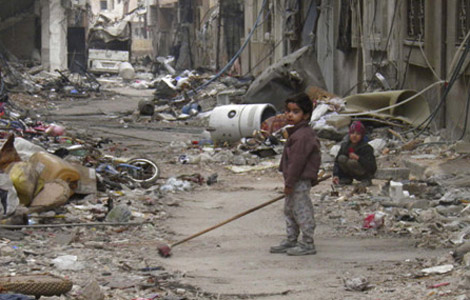
 Syria talks bring offer of exit from siege of Homs
Syria talks bring offer of exit from siege of Homs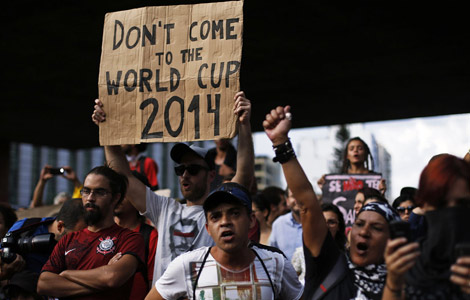
 Anti-World Cup protests wane in Sao Paulo
Anti-World Cup protests wane in Sao Paulo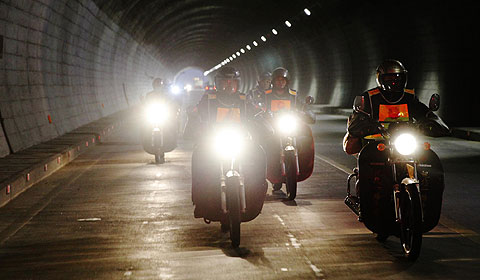
 Motorcyclists brave windchill for homecoming
Motorcyclists brave windchill for homecoming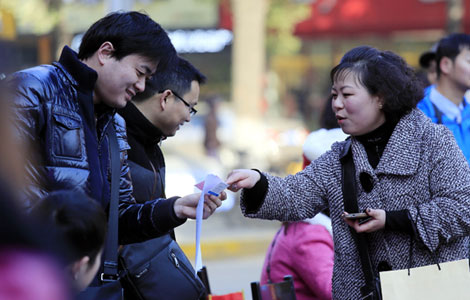
 8.8% salary hikes expected for 2014
8.8% salary hikes expected for 2014
 Holiday fireworks lose their sparkle amid smog
Holiday fireworks lose their sparkle amid smog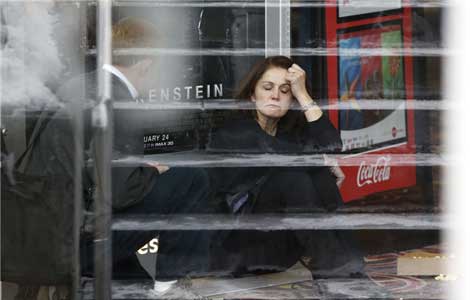
 Three dead in US mall shooting
Three dead in US mall shooting
 Thrill of victory
Thrill of victory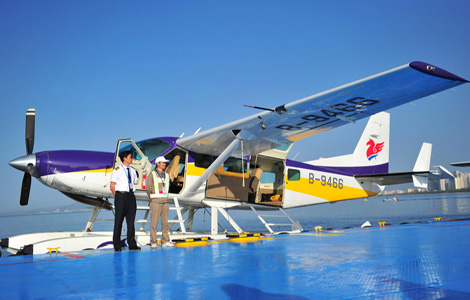
 First amphibious aircraft lures tourists
First amphibious aircraft lures tourists
Most Viewed
Editor's Picks

|

|

|

|

|

|
Today's Top News
Talent returns to China, but progress slow
US mall shooting gunman identified
China's banks must evolve or perish
China takes measures against H7N9
Holiday fireworks lose sparkle
US tariff investigation clouds commerce
Uygur teacher involved in separatism
Three dead in US mall shooting
US Weekly

|

|







